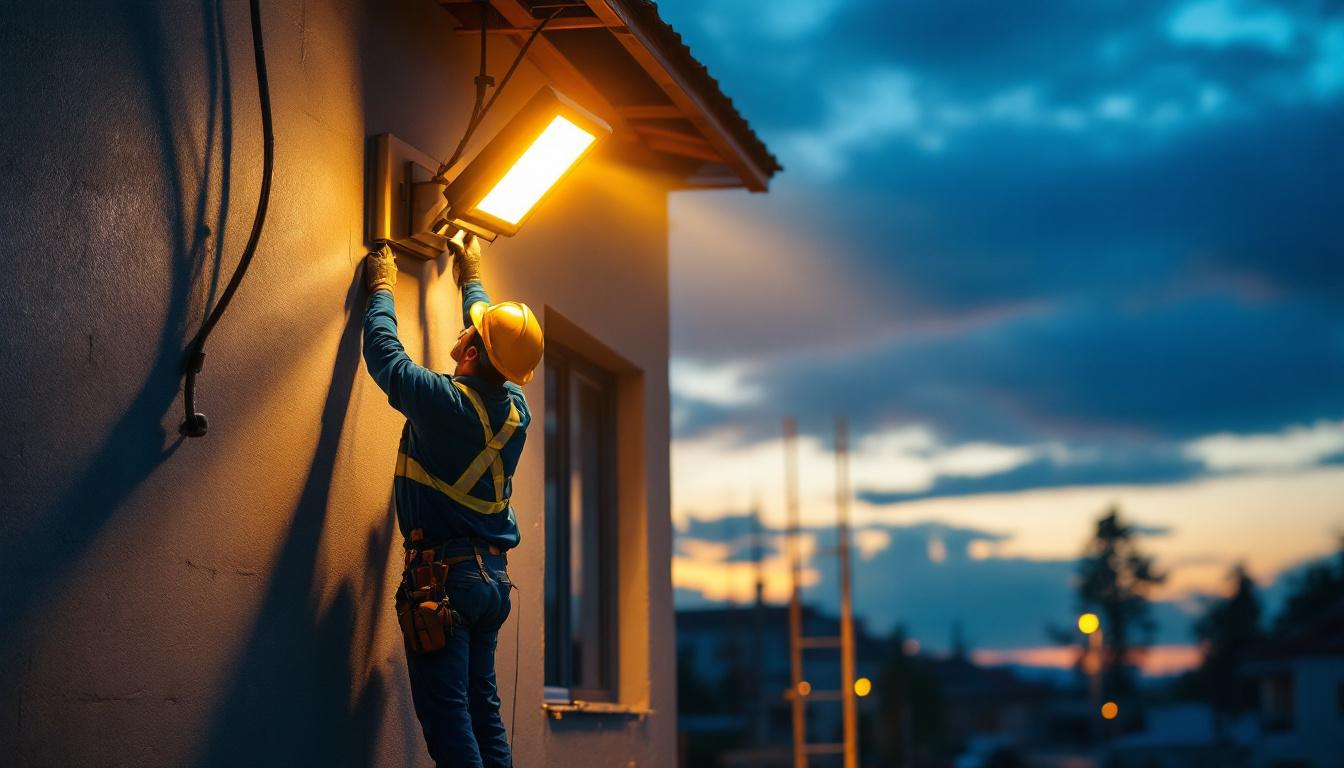
As the demand for sustainable energy solutions continues to rise, solar power lighting has emerged as a viable option for various applications. For lighting contractors, understanding the intricacies of solar power lights is essential for delivering innovative and future-proof projects. This article delves into the benefits, considerations, and best practices for implementing solar power lighting systems, ensuring that contractors are well-equipped to meet the evolving needs of their clients.
Solar power lighting systems offer numerous advantages that make them an attractive choice for both residential and commercial projects. Understanding these benefits can help contractors position their services effectively in a competitive market.
One of the most significant advantages of solar power lighting is its positive impact on the environment. By harnessing energy from the sun, these systems reduce reliance on fossil fuels, which in turn decreases greenhouse gas emissions. This eco-friendly approach aligns with the growing trend toward sustainability and can enhance a contractor’s reputation as a responsible business. Additionally, solar lighting systems contribute to biodiversity by reducing light pollution, which can disrupt local wildlife. By choosing solar, contractors not only promote cleaner energy but also support the preservation of natural habitats.
While the initial investment in solar power lighting may be higher compared to traditional lighting systems, the long-term savings can be substantial. Solar lights require minimal maintenance and have no ongoing electricity costs, which can lead to significant reductions in utility bills over time. For clients looking to cut costs, this can be a compelling selling point. Furthermore, many regions offer tax incentives and rebates for solar installations, which can offset the initial costs even more. This financial aspect makes solar lighting not just an environmentally friendly choice, but also a smart economic decision for budget-conscious clients.
Solar power lights are incredibly versatile, making them suitable for various applications, from street lighting to garden illumination. They can be installed in remote areas where traditional electrical infrastructure may be lacking, providing accessibility to lighting solutions in previously underserved locations. This adaptability opens up new opportunities for contractors to expand their service offerings. Moreover, solar lights come in a variety of designs and styles, allowing for customization that meets the aesthetic preferences of different clients. Whether it’s sleek modern fixtures for urban settings or rustic lanterns for country homes, the options are endless, enabling contractors to cater to diverse tastes and requirements.
While the benefits of solar power lighting are clear, several key considerations must be addressed to ensure successful project implementation. Lighting contractors should be well-versed in these factors to deliver effective solutions tailored to their clients’ needs.
A thorough site assessment is crucial for the successful installation of solar power lights. Factors such as location, available sunlight, and potential obstructions (like trees or buildings) can significantly impact the performance of solar lighting systems. Contractors should conduct detailed evaluations to determine the best placement and configuration for optimal energy absorption. Additionally, understanding the seasonal variations in sunlight exposure can help in planning for the most efficient energy usage throughout the year. For instance, areas that receive less sunlight during winter months may require a different approach, such as incorporating larger battery storage or selecting fixtures with higher energy efficiency ratings to ensure consistent illumination.
The components of a solar lighting system, including solar panels, batteries, and LED fixtures, must be carefully selected to ensure compatibility and efficiency. Contractors should prioritize high-quality components that offer durability and longevity. Additionally, understanding the specifications of each component can help contractors make informed decisions that align with their clients’ requirements. For example, selecting solar panels with a higher wattage can lead to increased energy production, while choosing batteries with a longer lifecycle can reduce maintenance costs over time. Furthermore, integrating smart technology, such as motion sensors or dimming capabilities, can enhance the functionality of the lighting system, providing both energy savings and improved user experience.
Compliance with local regulations and standards is essential when implementing solar power lighting projects. Contractors should familiarize themselves with any zoning laws, building codes, or environmental regulations that may affect installation. Staying informed about these requirements not only ensures project success but also protects the contractor’s reputation and business interests. Moreover, engaging with local authorities early in the planning process can facilitate smoother approvals and help identify any potential incentives or grants available for solar projects. This proactive approach not only streamlines the installation process but also enhances community relations by demonstrating a commitment to sustainable practices and compliance with local governance.
Designing solar lighting systems that can adapt to future needs is critical for long-term success. Contractors should consider several strategies to create flexible and scalable solutions.
Implementing modular designs allows for easy upgrades and expansions in the future. By using components that can be added or replaced without significant rework, contractors can provide clients with a system that grows alongside their needs. This approach not only enhances customer satisfaction but also positions the contractor as a forward-thinking professional.
Incorporating smart technology into solar lighting systems can significantly enhance their functionality and user experience. Features such as remote monitoring, automated dimming, and motion sensors can improve energy efficiency and provide clients with greater control over their lighting systems. As smart technology continues to evolve, contractors should stay updated on the latest innovations to offer cutting-edge solutions.
Designing solar lighting systems with scalability in mind allows for easy adjustments as client needs change. Whether expanding a lighting system to cover a larger area or integrating new technologies, contractors should create systems that can evolve without requiring complete overhauls. This flexibility can be a significant selling point for potential clients.
Proper installation is crucial for the performance and longevity of solar power lighting systems. Adhering to best practices during installation can help contractors avoid common pitfalls and ensure successful project outcomes.
Each solar lighting product comes with specific manufacturer guidelines that outline installation procedures, maintenance requirements, and performance expectations. Contractors should always follow these guidelines closely to maximize the efficiency and lifespan of the systems. This attention to detail can prevent issues down the line and enhance client satisfaction.
Before completing a project, thorough testing of the solar lighting system is essential. Contractors should verify that all components are functioning correctly and that the system operates as intended. Conducting quality assurance checks can help identify and resolve any issues before the client takes ownership, ensuring a smooth transition and positive experience.
Educating clients about their new solar lighting systems is an important aspect of the installation process. Providing clear instructions on operation, maintenance, and troubleshooting can empower clients to make the most of their investment. Additionally, offering ongoing support can foster long-term relationships and encourage referrals.
While solar power lighting systems are relatively low-maintenance, periodic checks and upkeep are still necessary to ensure optimal performance. Contractors should establish a maintenance plan that outlines recommended practices and schedules for clients.
Conducting regular inspections of solar lighting systems can help identify potential issues before they become significant problems. Contractors should encourage clients to check for debris on solar panels, ensure that batteries are functioning correctly, and verify that fixtures are clean and operational. Routine maintenance can prolong the life of the system and enhance its efficiency.
Batteries are a critical component of solar lighting systems, and their lifespan can vary based on usage and environmental factors. Contractors should inform clients about the expected lifespan of their batteries and provide guidance on when replacements may be necessary. Offering battery replacement services can also create additional revenue opportunities for contractors.
As technology advances, upgrading components of solar lighting systems may become necessary to maintain optimal performance. Contractors should stay informed about new products and innovations in the solar lighting industry, allowing them to recommend upgrades to clients when appropriate. This proactive approach can enhance client satisfaction and demonstrate a commitment to quality service.
Examining successful solar lighting projects can provide valuable insights and inspiration for contractors looking to implement similar solutions. These case studies highlight the versatility and effectiveness of solar power lighting in various settings.
In a bustling urban environment, a city implemented solar power lighting along its main thoroughfare. By utilizing solar lights equipped with smart technology, the city was able to reduce energy costs while enhancing public safety. The system featured motion sensors that adjusted brightness based on pedestrian traffic, demonstrating the potential for energy-efficient solutions in urban settings.
A local park sought to improve its lighting while maintaining its commitment to sustainability. By installing solar-powered lights throughout the park, the project not only enhanced visibility for visitors but also minimized the environmental impact. The use of LED fixtures ensured that energy consumption remained low, while the solar panels provided a reliable source of power.
In a remote community lacking access to traditional electrical infrastructure, solar power lighting proved to be a game-changer. The installation of solar lights in public areas significantly improved safety and accessibility for residents. This project highlighted the importance of solar lighting in enhancing quality of life in underserved regions, showcasing the potential for contractors to make a meaningful impact.
As the world shifts toward sustainable energy solutions, solar power lighting presents a unique opportunity for lighting contractors to future-proof their projects. By understanding the benefits, considerations, and best practices associated with solar lighting systems, contractors can deliver innovative solutions that meet the evolving needs of their clients.
Investing in solar power lights not only aligns with environmental goals but also positions contractors as leaders in the industry. By embracing new technologies, focusing on quality installations, and providing ongoing support, contractors can ensure their projects remain relevant and effective for years to come. The future of lighting is bright, and solar power is leading the way.
Ready to elevate your lighting projects with the efficiency and sustainability of solar power? At LumenWholesale, we provide lighting contractors with the highest quality, spec-grade solar lighting products at unbeatable wholesale prices. Say goodbye to local distributor markups and hello to superior lighting solutions that meet the highest industry standards. With our hassle-free bulk buying and free shipping, you can secure premium lighting for your future-proof projects at the best value — no hidden fees or compromises. Don’t miss out on the perfect blend of quality, affordability, and convenience. Wholesale Lighting at the Best Value is just a click away.

Discover essential tips and insights for lighting contractors on effectively utilizing UV light sanitizers in room settings.

Discover how lighting contractors are transforming spaces with ceiling fans, featuring real-world success stories and practical insights.

Discover how solar flood lights available on Amazon can revolutionize the way lighting contractors operate, offering significant savings in both time and money.

Discover the essentials of small can lighting with our comprehensive guide tailored for lighting contractors.